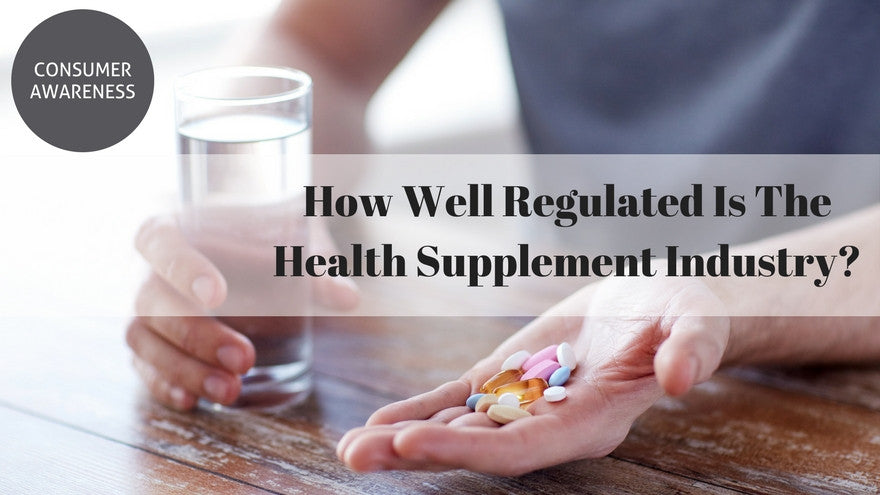
How Well Regulated Is The Health Supplement Industry?
By Tegan Watson, Co-founder and COO, Senescence Life Sciences
When we founded Senescence Life Sciences we saw entering the health supplement industry as an opportunity to positively impact an individual’s health. With a growing body of evidence supporting the efficacy and therapeutic potential of nutrition and nutritional support on long term health, we wanted to be part of this movement. Globally, governments, researchers and the healthcare industry are looking at nutrition as an effective method of prevention and management of chronic disease.
Being strong believers in the potential of health supplements, we were disheartened to find there’s still a great deal of work that needs to be done to ensure product safety and consistent quality controls across the industry.
In our conversations with friends and family we’ve come to realize that many people are unaware of this relaxed regulatory environment and strong need for consumers to be vigilant when buying health supplements. If it’s on the shelf and available for purchase, it doesn’t necessarily mean it’s safe for consumption or effective.
We’d like to share our knowledge of the industry with you, so that you can make informed decisions and protect your well-being. We’ve developed a series of blog posts that discuss some of the pitfalls of the industry, what we are doing to lead the change we want to see and what you as a consumer should look out for.
To kick things off, where better to start then by discussing the manufacturing and regulatory environment of the health supplement industry itself.
Do you know what regulated manufacturing processes are required to produce vitamins and dietary supplements? Unfortunately, there aren’t many. The truth is, just about anyone can manufacture and distribute a health supplement.
Many of you may be surprised to learn that the majority of health supplements produced today are manufactured by contract manufacturers. These manufacturers focus exclusively on the manufacturing and packaging of health supplements and can streamline operations and costs, which make health supplements more affordable. This enables “own-label” distributors to bring products to market without the large capital investments that would be required if they needed to purchase a facility, equipment and recruit skilled labour themselves.
Of course, not all contract manufacturers are the same. They vary in their standard operating procedures, safety and quality controls. In today’s regulatory environment, the best metric for ensuring the products you consume are manufactured under stringent quality controls and with proper risk mitigation is to look out for the Good Manufacturing Practices (GMP) certification.
GMP certification is issued by third-party associations such as the USFDA, European Commission and Singapore HSA and assures a higher level of quality and confidence in a product. Manufacturers, however, do not require GMP certification to operate, nor do all countries require products sold to be manufactured in a GMP certified facility. Therefore, it is up to you to do your due diligence before purchasing health supplements.
All of our products are manufactured in Canada - one of the few countries that require mandatory licenses and pre-market approval for the manufacturing and sale of health supplements. Canadian manufacturers must obtain GMP certification issued by Health Canada as part of their site license approval, and are required to be licensed in order to operate a manufacturing facility.
Compared to pharmaceutical products and over-the-counter medicines, the regulatory environment for health supplements is extremely relaxed. In most countries it is the responsibility of the manufacturers and distributors to evaluate the safety and labeling of their own products and to ensure they meet all the requirements of the local governing bodies. Only after the product reaches the market are most authorities responsible for monitoring and taking certain actions against a company alleged to be non-compliant with their guidelines.

Unfortunately, a number of industry scandals have recently swept across the globe, with one of the most prominent being a study conducted by the University of Guelph in Canada in 2012. Researchers tested 44 health supplements sold across the USA and Canada for purity and found 60% of the products contained ingredients not listed on the label, over 20% included fillers and possible allergens not listed on the label, and 1 in 3 proved to be fakes.
This study sheds light on the fact that stricter quality control and standards must come from the industry and not just regulating bodies. Manufacturers and distributors must be accountable for their products and consumer health, and abiding by the minimum standards set by regulating bodies for manufacturing, testing and purity is not enough.
We’ve gone a step further at Senescence Life Sciences by mandating that all of our product batches be tested by a third-party lab to ensure they meet our internal safety standards. When setting these standards, we aim to far exceed the minimum safety standards set by the Singapore HSA and Health Canada, because we believe that consumer safety isn’t meeting the minimum, it’s achieving the max.
As an individual you have a lot of power. Not only can you lobby for stronger regulations, but by supporting ethical and transparent manufacturers and distributors you can force companies to change. Your demand for higher quality products, transparency, and science backed formulations will continue to push the industry in the right direction.
At Senescence Life Sciences, we strive to be a leader of this change and advocate for holistic health, education, transparency, and safe, high quality products. Not only have we pushed for higher standards in the industry, but we’ve proven that companies can produce top quality products and still remain commercially viable.
We continue to challenge the minimum testing standards and demand more from our suppliers and manufacturers, ensuring efficacy and individual safety and well-being.
Consumer Tips
|
Sources:
[3] https://www.fda.gov/food/dietarysupplements/
[4] https://www.fda.gov/ForConsumers/ConsumerUpdates/ucm050803.htm
[5] http://www.cbc.ca/news/health/fifth-estate-vitamins-herbal-health-canada-1.3316208
Subscribe to our RSS Feed.
